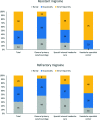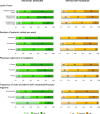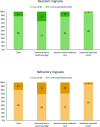Burden and attitude to resistant and refractory migraine: a survey from the European Headache Federation with the endorsement of the European Migraine & Headache Alliance
- PMID: 34006218
- PMCID: PMC8130435
- DOI: 10.1186/s10194-021-01252-4
Burden and attitude to resistant and refractory migraine: a survey from the European Headache Federation with the endorsement of the European Migraine & Headache Alliance
Abstract
Background: New treatments are currently offering new opportunities and challenges in clinical management and research in the migraine field. There is the need of homogenous criteria to identify candidates for treatment escalation as well as of reliable criteria to identify refractoriness to treatment. To overcome those issues, the European Headache Federation (EHF) issued a Consensus document to propose criteria to approach difficult-to-treat migraine patients in a standardized way. The Consensus proposed well-defined criteria for resistant migraine (i.e., patients who do not respond to some treatment but who have residual therapeutic opportunities) and refractory migraine (i.e., patients who still have debilitating migraine despite maximal treatment efforts). The aim of this study was to better understand the perceived impact of resistant and refractory migraine and the attitude of physicians involved in migraine care toward those conditions.
Methods: We conducted a web-questionnaire-based cross-sectional international study involving physicians with interest in headache care.
Results: There were 277 questionnaires available for analysis. A relevant proportion of participants reported that patients with resistant and refractory migraine were frequently seen in their clinical practice (49.5% for resistant and 28.9% for refractory migraine); percentages were higher when considering only those working in specialized headache centers (75% and 46% respectively). However, many physicians reported low or moderate confidence in managing resistant (8.1% and 43.3%, respectively) and refractory (20.7% and 48.4%, respectively) migraine patients; confidence in treating resistant and refractory migraine patients was different according to the level of care and to the number of patients visited per week. Patients with resistant and refractory migraine were infrequently referred to more specialized centers (12% and 19%, respectively); also in this case, figures were different according to the level of care.
Conclusions: This report highlights the clinical relevance of difficult-to-treat migraine and the presence of unmet needs in this field. There is the need of more evidence regarding the management of those patients and clear guidance referring to the organization of care and available opportunities.
Keywords: Migraine; Migraine care; Refractory migraine; Resistant migraine.
Conflict of interest statement
Mark Braschinsky: Fees as a speaker or for participation to advisory boards from Abbott Laboratories, Allergan Inc., Berlin-Chemie AG (Menarini Group), Boehringer Ingelheim Pharma GmbH, Desitin Arzneimittel GmbH, EV3, Gedeon Richter Ltd., GlaxoSmithKline, KBM Pharma Ltd., H. Lundbeck A/S, Novartis Pharma Services Inc., Nycomed SEFA, Orion Pharma, Pfizer Inc., Sanofi-Aventis, Sandoz d.d., Scanmed Group, Solvay Pharmaceuticals, Teva Pharmaceutical Industries Ltd./Sicor Biotech UAB, Zentiva International. Previously consultant for H. AbbePharma GmbH, Merz Pharmaceuticals.
Anne Ducros: Fees as speaker or participation to advisory boards from Eli-Lilly, Novartis, Teva.
Zaza Katsarava: Fees as speaker or participation to advisory boards from Novartis, Lilly, TEVA, Allergan, Merck and Daiichi.
Christian Lampl: Fees as speaker or for participation to advisory boards from Allergan, Eli-Lilly, Novartis, Pfizer, Teva.
Patrick Little: none.
Paolo Martelletti: Fees as speaker or for participation to advisory boards from Allergan, Eli-Lilly, Novartis, Teva.
Antoinette Massen van den Brink: Research grant and/or speaker/consultant fees from Amgen/Novartis, Eli-Lilly, Teva.
Patricia Pozo-Rosich: Fees as consultant and speaker for Allergan, Almirall, Biohaven, Chiesi, The Corpus, Eli Lilly, Medscape, Neurodiem, Novartis and Teva. Research funding from, AGAUR, ERANet Neuron, FEDER RISC3CAT, la Caixa foundation, Instituto Investigación Carlos III, MICINN, Migraine Research Foundation, Novartis, PERIS; funding for clinical trials from Alder, Allergan/AbbVie, Electrocore, Eli Lilly, Lundbeck, Novartis and Teva.
Uwe Reuter: Fees as consultant and speaker for Allergan, Biohaven, The Corpus, Eli Lilly, Medscape, Novartis, STREAMedUP and Teva. Research funding from BMBF and Novartis, Institutional funding for clinical trials from Alder, Amgen. Allergan, Eli Lilly, Novartis and Teva.
Elena Ruiz de la Torre: none.
Simona Sacco: Fees as speaker or for participation to advisory boards from Abbott, Allergan, AstraZeneca, Eli-Lilly, Medscape, Novartis, Teva.
Margarita Sanchez Del Rio: Fees as speaker or for participation to advisory boards from Allergan, Eli-Lilly, Novartis, Teva.
Alexandra J Sinclair: Fees as speaker from Novartis and Allergan.
Valeria Caponnetto: Fees as member of Advisory Board from Novartis.
Figures





References
MeSH terms
LinkOut - more resources
Full Text Sources
Other Literature Sources
Medical

